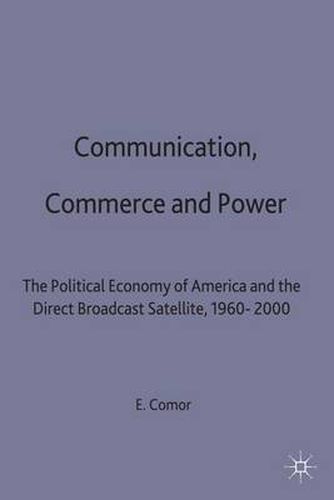Readings Newsletter
Become a Readings Member to make your shopping experience even easier.
Sign in or sign up for free!
You’re not far away from qualifying for FREE standard shipping within Australia
You’ve qualified for FREE standard shipping within Australia
The cart is loading…






This title is printed to order. This book may have been self-published. If so, we cannot guarantee the quality of the content. In the main most books will have gone through the editing process however some may not. We therefore suggest that you be aware of this before ordering this book. If in doubt check either the author or publisher’s details as we are unable to accept any returns unless they are faulty. Please contact us if you have any questions.
In this history of US-based direct broadcast satellite developments, the United States and other nation-states are shown to be the ultimate arbiters of their ongoing histories. In making this now unfashionable argument, Edward A. Comor directly challenges recent academic work that tends to privilege global processes over national, and argues that the contemporary world order is being shaped primarily by transnational rather than nation-state-based forces. In testing this orientation with empirical research on US foreign communication policy since 1960, Communication, Commerce and Power compels academics and policy makers to rethink commonplace assumptions about the characteristics and potentials of the contemporary and future international political economy.
$9.00 standard shipping within Australia
FREE standard shipping within Australia for orders over $100.00
Express & International shipping calculated at checkout
This title is printed to order. This book may have been self-published. If so, we cannot guarantee the quality of the content. In the main most books will have gone through the editing process however some may not. We therefore suggest that you be aware of this before ordering this book. If in doubt check either the author or publisher’s details as we are unable to accept any returns unless they are faulty. Please contact us if you have any questions.
In this history of US-based direct broadcast satellite developments, the United States and other nation-states are shown to be the ultimate arbiters of their ongoing histories. In making this now unfashionable argument, Edward A. Comor directly challenges recent academic work that tends to privilege global processes over national, and argues that the contemporary world order is being shaped primarily by transnational rather than nation-state-based forces. In testing this orientation with empirical research on US foreign communication policy since 1960, Communication, Commerce and Power compels academics and policy makers to rethink commonplace assumptions about the characteristics and potentials of the contemporary and future international political economy.